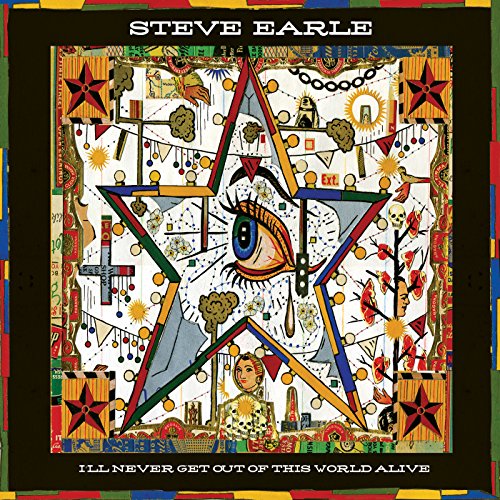
Steve Earle
I'll Never Get Out of This World Alive
Release Date: Apr 26, 2011
Genre(s): Country, Americana, Pop/Rock, Contemporary Singer/Songwriter, Progressive Country
Record label: New West
Music Critic Score
How the Music Critic Score works
Album Review: I'll Never Get Out of This World Alive by Steve Earle
Very Good, Based on 9 Critics
Based on rating 5/5
Between acting (The Wire), fiction writing (his novel arrives in May) and psychedelic calls to arms ("The Revolution Starts Now"), it's easy to forget that Steve Earle is a country singer. He reminds you here. Produced by T Bone Burnett, this may be the shaggy outlaw's most polished set: Check the movingly animist "God Is God," the stately Cajun "Waitin' on the Sky" and Earle's own singing, which transcends his usual blasted croak.
Based on rating 8.0/10
Steve Earle has never been one to pull his punches. In both his spectacularly troubled personal life and his rough and tumble songs, subtlety has never been the name of the game. Nothing’s changed this time around, and the release of I’ll Never Get Out Of This World Alive with songs like “Little Emperor” — Earle’s final kiss-off to the Bush era — and the Woody Guthrie-inspired “Gulf of Mexico” show that recent successes evidenced by Grammy and Emmy awards, a celebrated acting career and a soon-to-be-released novel have done nothing to dull his wicked edge.
Based on rating 7/10
According to Steve Earle's liner notes for I'll Never Get Out of This World Alive, these 11 songs are all "about mortality in one way or another." Certainly the title -- after a song by Hank Williams (also the title of Earle's new novel) -- reflects this, but these songs bear that out in spades. Two of them, "God Is God" and "I Am a Wanderer," were written for Joan Baez and appeared on her Day After Tomorrow album. Earle's versions are less stylized, more worldweary, ragged, and poignant.
Based on rating 3.5/5
Too rowdy and too outspoken in his liberal politics to make a huge dent as a country music star, Steve Earle has worked hard to perfect his image as one of Nashville’s true outsiders. Though that’s led to some heavy-handed political songwriting over the course of his career, Earle’s latest, I’ll Never Get Out of This World Alive, drops the shit-stirring and the outraged screeds. Focused as it is on more personal and more broadly humanist songs, the album is Earle’s finest in years.
Based on rating 6/10
I was wrong about the last two Steve Earle albums. A longtime fan, I’d come in around Copperhead Road, done my retroactive research via Guitar Town and Exit O, and stayed loyal through the subsequent troughs and peaks of Earle’s personal and professional life. Against critical consensus, I found desperate beauty and brave truth in “drug period” albums like The Hard Way; in line with critical consensus, I was overjoyed when Earle began his road to recovery and became the prolific, sober workaholic we now know (musician, producer, novelist, playwright, actor, activist, DJ, etc.
Based on rating 5.8/10
Empathy is Steve Earle's calling card. Many of the best songs Earle's written find him telling the story of some real or imagined person who has either endured an injustice or been widely demonized or misunderstood. A badass with a bleeding heart, Earle has lent compassion to criminals ("Billy Austin", "Tom Ames' Prayer", "John Walker's Blues") as well as given voice to the kinds of disenfranchised people who rarely have one ("Good Ol Boy (Gettin' Tough)", "Taneytown", "Home From Houston").
Opinion: Excellent
Grammy voters love Steve Earle, for better or worse. His last three studio albums, “The Revolution Starts … Now,” “Washington Square Serenade” and “Townes” shut out all other contenders in the Best Contemporary Folk/Americana category, which is too bad, because “Townes” didn’t deserve the win and means there’s little chance this stronger album will get a nod. Grammy voters couldn’t possibly give the same award to four albums in a row by the same guy, could they? Of course, stranger things have happened.
Opinion: Very Good
Foggy production dulls roots legend’s 2011 Grammy contender. Ninian Dunnett 2011 Steve Earle’s talent has never been in doubt, and his commitment to the rootsy genre he dragged into popularity in the 80s has never wavered. And if this T-Bone Burnett-produced album isn’t a standout, it still has plenty going for it. In the last decade Earle settled into the sort of steady output that began netting him Grammy Awards after all these years (three, like compensation, between 2004 and 2010).
Opinion: Very Good
Harrowing twists and meaningful turns so define Steve Earle's career that mortality underlies his oeuvre in powerfully subtle ways. Never one to do anything less than whole hog, I'll Never Get Out of This World Alive tackles the subject head-on, both as a collection of new songs and as a novel, their shared title taken from Hank Williams' last single. The book imagines the doctor who administered Williams' last shot of morphine being haunted by the country music icon's ghost.

